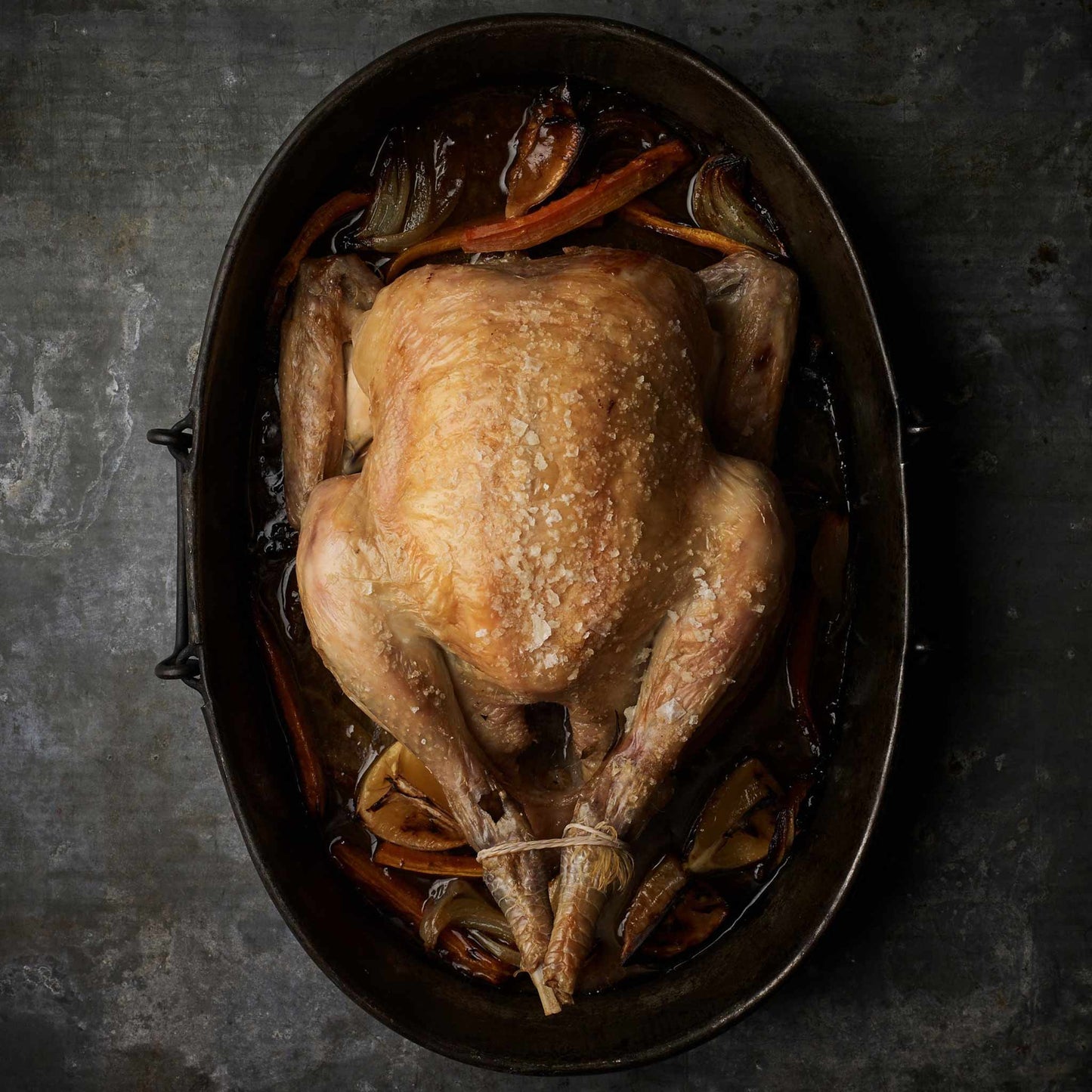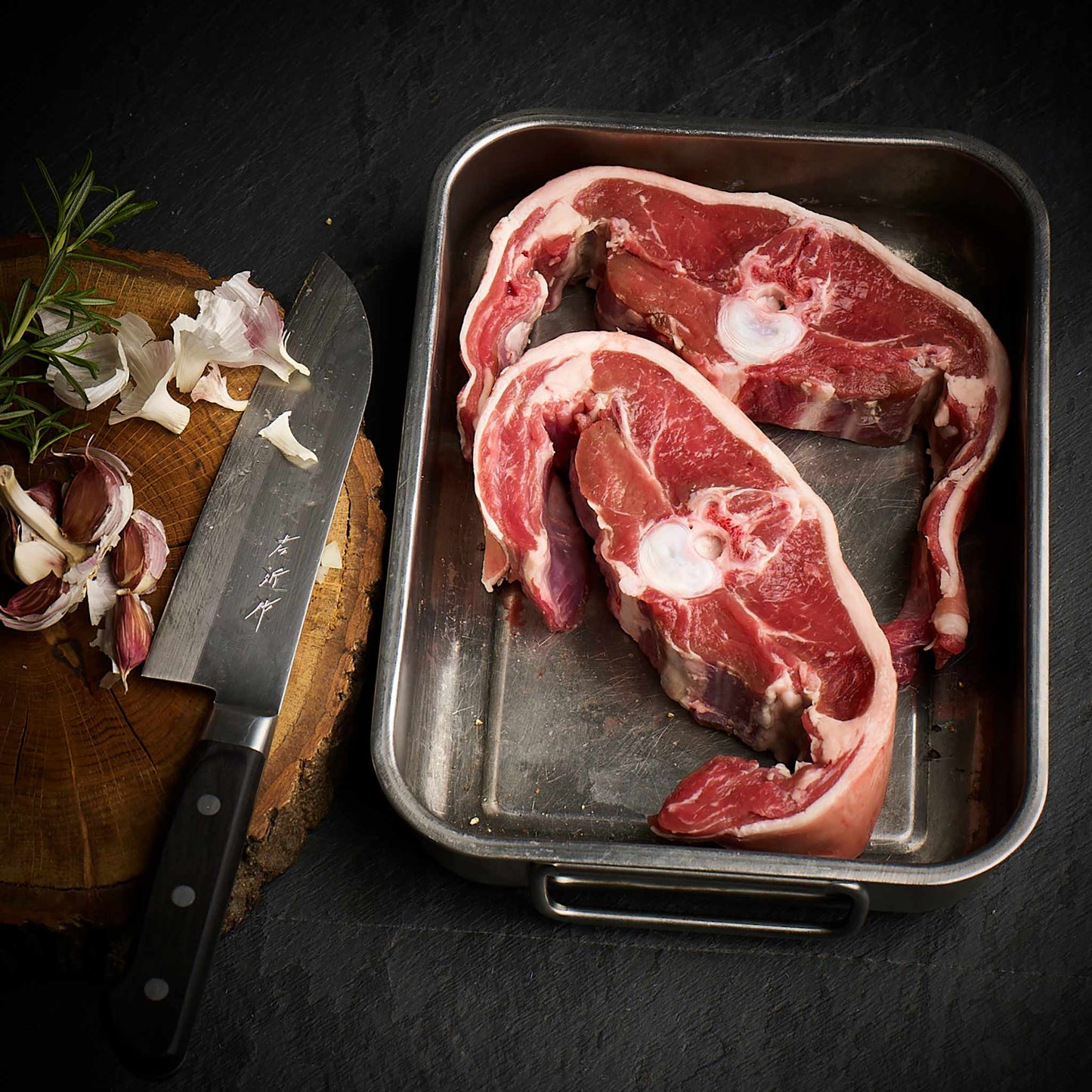We source our chicken from one farm in Leicestershire. The farm is Pasture for Life certified and rears truly free range, outdoor birds.

Humans are social animals and ever since we've been humans one of the most important social bonding practices has always been eating together.
Gathering to eat makes us happier. There really is a reason that humans have been sharing communal meals since time began. When we eat together, our so-called ‘animal brains’ receive the message that we are safe, satisfied and loved, and our bodies are flooded with positive hormones and emotions.
Back when 'we' were hunter / gatherers our ancestors who gathered would likely have eaten some of what they found while they were out and brought some back for the rest of the group, the same is true of the hunters, they likely would have eaten some of the kill in the field and brought the rest back for the tribe.
Food has many meanings for us, but when a group of people gather together the process of eating is always more about power than about nourishment. When we lived in tribes everyone may have crowded round the carcass, but you can be sure that it was the warrior men who ate first and took the best bits and that the women and children were served last and got what was left over. When tables and chairs first came into use, only those with power sat at the table, and then in a strict order of importance, with a bowl of salt showing who was top dog. The bowl of salt might have disappeared, but the hierarchical seating order still prevails.
The importance of the 'family meal' in restaurants
Photo by Dan Rooney on Unsplash

The Ethical Butcher has a rapidly growing arm of our business serving the restaurant trade and we became aware of the term 'family meal' on our orders sheet, it not what you might think, it doens't mean the restaurant is catering for families, it means it is a family.
The daily staff meal – also known as the family meal – is a time-honoured ritual where the entire team, from the dishwashers to the executive chef, sit down to eat together. The meal, provided free of charge, is viewed as a form of bonding and is usually served in the afternoon, before the dinner service.
This meal provides more than simply the calories required to power the workers through as shift, it provides a powerful bonding experience, bringing together the separate entities as team.
The restaurant family meal can simply consist of using up leftovers and reducing waste by serving the least popular dishes from the menu but it also offers other opportunities to act as a tasting of the current menu or new menu items which can be especially useful for serving staff who are expected to be able to communicate the dished to customers.
The using up of leftovers is a crucial step to waste reduction in a commercial kitchen.
Another quirk of the family meal is that a restaurant’s staff can sometimes take it in turns to cook it, meaning that kitchen porters and cleaners also get to display their culinary prowess. Sometimes, the meals staff eat end up on the menus that regular diners can order from. These orders might appear on our order sheets for a restaurant with requests for cuts that are incongruous with the menu.
Restaurant staff form tight bonds, work very hard and need a strong sense of belonging and carraderie to cope with the pressure of a busy service.
This bonding that happens when we eat together is of the utmost importance in other industries and professions where a strong sense of team is needed for the job.
The Fire Service family meal.
With shifts scheduled around the clock, a communal-living workplace, and high-stress moments broken up by long periods of waiting around, food has always been at the heart of the fire service.
This paper titled: Eating Together at the Firehouse: How Workplace Commensality Relates to the Performance of Firefighters
The abstract states:
Using a mix of qualitative and quantitative methods, our field research shows a significant positive association between commensality and work-group performance. Our findings establish a basis for research and practice that focuses on ways that firms can enhance team performance by leveraging the mundane and powerful activity of eating.
Picture - Hereford & Worcester Fire and Rescue Service

Many fire stations contain proper kitchen facilities such as the image above which goes to highlight the importance of meal preparation and consumption in bringing us humans together as a team. Fire Stations will have a hierarchical structure of command that is forgotten when eating together with reports of different members of the team having special dishEs they will cook on rotation.
How the family meal is changing at home
So what about our actual families rather than the examples of metaphorical ones listed above, is our relationship to the family meal changing?
It seems that in a relatively short period of human history we've developed and partially lost the importance of the ritual of eating together from the family unit.
From the Guardian article referenced at the top of this article:
Until recently, children had no power or importance, and so there was no place for them at the dining table. It has never been the tradition in Britain for children to be brought up in close proximity to their parents. If children had not been sent away to school or to work they ate in the kitchen or in the nursery.
In Victorian times family meals were held on special occasions, but these again were occasions where power and importance were demonstrated. The father took precedence over all others. Children were required not to speak until spoken to and to follow a set of rules relating to what was regarded as proper behaviour at the table.
Today many parents still impose the rule that a child must ask permission to leave the table. This rule certainly suggests that children have been forced to come to the table and, if given the choice, they would eat elsewhere.
The family meal would probably have remained a rare trial had the second world war not robbed middle and upper class families of their servants. Suddenly, women had to learn to cook and serve their family meals. This was a tedious, time-consuming process, especially when there were none of the labour-saving devices which we take for granted today. To get feeding the family over as quickly as possible the women wanted the family to eat together. So the daily family meal was born.
Performing an act for another human being, like cooking for them, is a form of altruism. And altruism can make people feel happy and connected to others, it is often said that the second most complete way we can give pleasure to another human beyond touch is to prepare food for them.
When we prepare a meal for a loved one, a friend, a colleague or even a customer we are putting a part of ourselves into the act that is consciously and subconsciously absorbed by the person receiving the food, if our preparation is rushed and performed without love, this too can be felt and transmitted, it is important to cook with mindfulness and intention.
Much of the world doesn't sit at tables as we do here in the UK, estimates are that 1/4 of the current population doesn't eat at a table. Historically we most likely sat on the ground around a communal fire or crouched on the floor. In our culture however the dining table has become a place of cultural significance, the one place where we gather as a family for meals or discussions.
The dining table is disappearing from our homes as our eating habits change. We increasingly eat at the computer, standing in the kitchen, on the sofa in front of the television, in the car or on the street, this is having a detrimental effect on our nutrition.
When we eat together as a ritual we eat more slowly, when we eat more slowly we have increased satiety. Slow spaced eating is associated with improved satiety and gut hormone responses in normal-weight participants. Study
When food is prepared in the kitchen as a family meal we know what ingredients are used, we are in control.
One 2017 study from the University of Cambridge found that people who cooked five nights a week or more were 28 percent less likely to have an overweight BMI and 24 percent less likely to have excess body fat than those who cooked three times a week or fewer.
The mindful preparation of a meal for a loved one is a very intimate act. Our bare hands are interacting with once living ingredients which will become the bodies of our loved ones, cooking for the people we love is a way of expressing our love on a very deep level, the person who prepares meals in the family is literally providing the substance, the actual matter that is the family be it your blood family or your work family, eating together brings us together.



